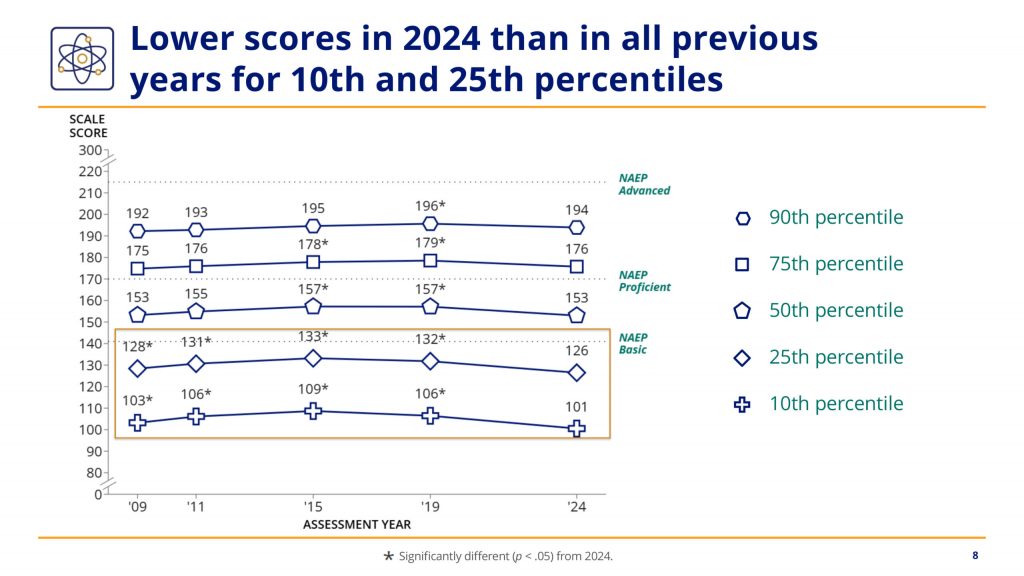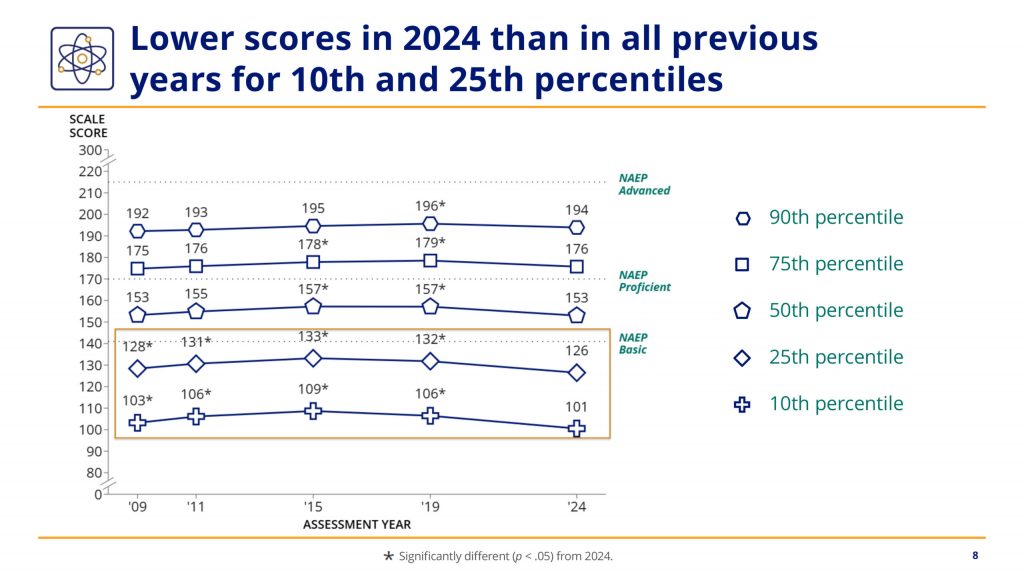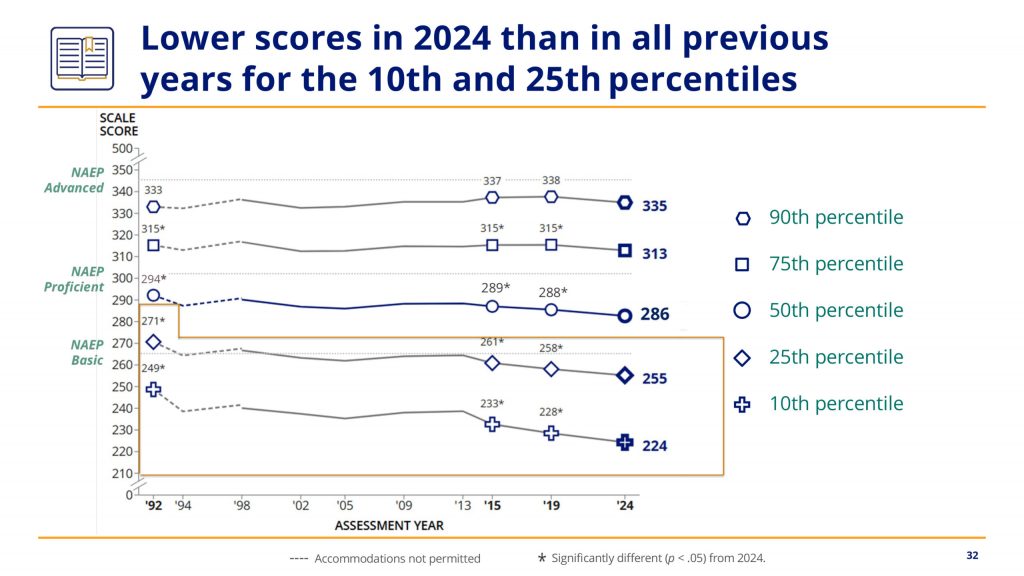National Test Scores Show Declines for 8th and 12th Graders
NAEP tests show declines since 2019 in math, reading and science scores.
Only about one-third of the nation’s 12th graders are ready for entry-level college math work or first-year college reading courses, according to data released this week.
Newly released test results from the U.S. Department of Education’s National Assessment of Educational Progress, or NAEP, show 12th-grade scores in reading and math declined since 2019 and are the lowest ever reported on these assessments.
“And this is happening at a time when rapid advancements in technology and society demand more of future workers and citizens, not less,” Muldoon continued. “We have seen progress before on NAEP, including greater percentages of students meeting the NAEP proficient level. We cannot lose sight of what is possible when we use valuable data like NAEP to drive change and improve learning in U.S. schools.”
This round of NAEP tests, conducted from January through March 2024, measured student achievement as students entered and exited high school.
NAEP only provides the data, not an analysis of why scores are falling.
Along with 12th grade math and reading, NAEP released the results of eighth grade science tests.
Science scores declined between 2019 and 2024 in three of the four regions of the country, including the Midwest. The score was not significantly different for students in the West.
Those scores mark the first time the average science score for eighth-graders fell since the current assessment began in 2009.
While the science score gap between male and female students had closed in 2019, boys once again outscored girls in 2024.

National eighth grade NAEP science scores. Average scores are lower than in 2019. Graph courtesy the Department of Education
NAEP, known as the Nation’s Report Card, often reveals a picture of privilege among students.
In 12th grade reading and math, as well as eighth grade science, the steepest declines were observed among the country’s lowest-performing students.
Matthew Soldner, acting commissioner of the National Center for Education Statistics, said seeing students who had been struggling before the pandemic continue to lose ground is “sobering.”
When NAEP released the fourth and eighth grade reading and math test results in January, Wisconsin had the widest gap in the U.S. for white and Black students.
The test results released this week don’t include individual state data.
Test scores are based on data from about 23,000 eighth graders in science; 19,300 12th graders in mathematics; and 24,300 12th graders in reading who were tested from January through March 2024.
Students from private and public schools were tested, but scores are not separated.
Soldner said private school data can only be separated if 70 percent of the private schools agree to it, and NAEP did not have enough agreement.
The NAEP science assessment measures students’ knowledge of three broad content areas — physical science, life science, and Earth and space sciences — and four science practices — identifying science principles, using science principles, using scientific inquiry and using technological design — that describe how students use their science knowledge.
The NAEP mathematics assessment of 12th graders measures students’ knowledge in four content areas — number properties and operations; measurement and geometry; data analysis, statistics, and probability; and algebra — as well as students’ ability to solve problems in mathematical and real-world contexts.
In 2024, the average grade 12 mathematics score was the lowest it has been since the current assessment began in 2005.

In 2024, the average grade 12 mathematics score was the lowest it has been since the current assessment began in 2005. Graph courtesy the Department of Education
The NAEP reading assessment uses literary and informational texts to measure students’ reading comprehension skills, particularly as they relate to students’ abilities to locate and recall information, integrate and interpret what they have read, and critique and evaluate the text.
The average grade 12 reading score was lower in 2024 than in all previous assessments.

The average grade 12 reading score was lower in 2024 than in all previous assessments. Graph courtesy the Department of Education
Muldoon said the NAEP standards are not always consistent with how individual states measure proficiency, which can cause confusion about student performance. Wisconsin changed its standardized test proficiency levels last year to better align with “where students are academically.”
“It’s a challenging bar,” Muldoon said.
Students entering and exiting high school have declining scores in math, reading and science was originally published by Wisconsin Public Radio.
If you think stories like this are important, become a member of Urban Milwaukee and help support real, independent journalism. Plus you get some cool added benefits.























For the last three decades when there was a viewpoint that our students were not being educated, the educational elite along with research gurus and statisticians decided to find a way to give a number to create an illusion of educational improvement/decline. Standardized tests which had been historically used to help a school decide where its students needed help were morphed into high stakes testing from which the research gurus decided what is competency based on some statistical voodoo. High stakes testing forced many school districts into adopting “miracle curriculums” which did not show any significant improvement in outcomes. Most any creative endeavor from teachers or schools that showed promised most often was shut down due to the need for high test scores. The “solution” was the problem.
While the state of Wisconsin administers a test at all schools (Wisconsin Froward Exam) and publishes results for individual schools, NAEP only publishes aggregated data for regions and states. So maybe some school disricts are trying to teach to the “test” but it is not the NAEP. The International Student Assessment (PISA) ALSO shows student scores (15 year olds) in math declining in the United States. The U.S. earned an average math score of 465, the international average was 480. The real problem with our schools centers around poverty and inequality, which largely explains the lower scores.